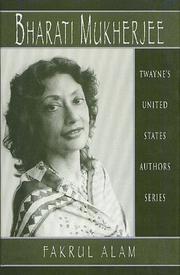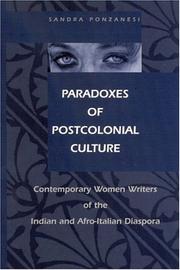| Listing 1 - 3 of 3 |
Sort by
|

ISBN: 0805739971 0805739238 Year: 1996 Volume: 653 Publisher: New York London [etc.] Twayne Publishers Prentice Hall International
Abstract | Keywords | Export | Availability | Bookmark
 Loading...
Loading...Choose an application
- Reference Manager
- EndNote
- RefWorks (Direct export to RefWorks)
East Indian Americans in literature --- Mukherjee, Bharati --- Criticism and interpretation --- Women and literature --- Canada --- History --- 20th century --- United States --- India --- In literature
Book
ISBN: 1643360019 9781643360010 9781643360003 Year: 2019 Publisher: Coumbia, South Carolina
Abstract | Keywords | Export | Availability | Bookmark
 Loading...
Loading...Choose an application
- Reference Manager
- EndNote
- RefWorks (Direct export to RefWorks)
"Bharati Mukherjee was an important, bold, pioneering American writer. Born in Calcutta, India on July 27, 1940 to Sudhir Lal Mukherjee and Bina (nee Chatterjee), a Bengali Brahmin couple, the young Bharati--the middle of three daughters--enjoyed a privileged early life. Mukherjee's father was a biochemist who ran a successful pharmaceutical company and supported a wide network of some fifty relatives all based within the same house in Ballygunge, south Calcutta. A precociously intelligent child, Mukherjee was always highly literate, stimulated by her parents to read and study. Consuming books in a quiet corner was often a refuge from the claustrophobic demands of traditional Indian joint family living, and she began writing stories as a young child. Mukherjee was inspired by the storytelling of her paternal grandmother and her mother. Indeed, she consistently paid tribute to Bina, who proudly defended and encouraged Mukherjee and her two sisters, Mira and Ranu, against a patriarchal backdrop of ridicule from Bina's older, female in-laws for having borne Sudhir no sons." --
Immigrants in literature. --- Emigration and immigration in literature. --- East Indians --- East Indian Americans in literature. --- Mukherjee, Bharati --- Criticism and interpretation. --- India --- Canada --- In literature.

ISBN: 9780791462010 0791462013 0791484513 1423740076 9781423740070 9780791484517 9780791484517 Year: 2004 Publisher: Albany, N.Y. State University of New York Press
Abstract | Keywords | Export | Availability | Bookmark
 Loading...
Loading...Choose an application
- Reference Manager
- EndNote
- RefWorks (Direct export to RefWorks)
This innovative contribution to understanding the promise and contradictions of contemporary postcolonial culture applies a wide array of theoretical tools to a large body of literature. The author compares the work of established Indian writers including Bharati Mukherjee, Meena Alexander, Sara Suleri, and Sunetra Gupta to new writings by such Afro-Italian immigrant women as Ermina dell'Oro, Maria Abbebù Viarengo, Ribka Sibhatu, and Sirad Hassan. Sandra Ponzanesi's analysis highlights a set of dissymmetrical relationships that are set in the context of different imperial, linguistic, and market policies. By dealing with issues of representation linked to postcolonial literary genres, to gender and ethnicity questions, and to new cartographies of diaspora, this book imbues the postcolonial debate with a new élan.
Migration. Refugees --- English literature --- anno 1900-1999 --- Africa --- India: East --- Indic literature (English) --- American literature --- Italian literature --- East Indian American women --- Immigrants' writings --- East Indians --- Emigration and immigration in literature. --- Africans --- East Indian Americans in literature. --- Postcolonialism in literature. --- South Asians in literature. --- Women and literature. --- Literature --- Ethnology --- Asian Indians --- Indians, East --- Indians (India) --- Indic peoples --- Writings of immigrants --- Women, East Indian American --- Women --- Ottovolante (Group of writers) --- British literature --- Inklings (Group of writers) --- Nonsense Club (Group of writers) --- Order of the Fancy (Group of writers) --- Agrarians (Group of writers) --- Indo-English literature --- Indic literature --- Women authors --- History and criticism. --- South Asian American authors --- South Asian authors --- Intellectual life. --- Littérature de l'Inde de langue anglaise --- Littérature américaine --- Littérature anglaise --- Littérature postcoloniale --- Écrits d'immigrés --- Femmes et littérature --- Femmes écrivains --- Histoire et critique --- Auteurs d'origine asiatique
| Listing 1 - 3 of 3 |
Sort by
|

 Search
Search Feedback
Feedback About UniCat
About UniCat  Help
Help News
News